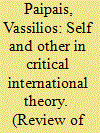| Srl | Item |
| 1 |
ID:
184792


|
|
|
|
|
| Summary/Abstract |
Following in the wake of the People’s War (1996–2006) and the 2015 earthquakes, donor-funded projects supporting community mental health programmes and psychosocial counselling have proliferated in Nepal. This article explores one outcome of the expansion of ‘psy’: the transformation of ghosts and spirits, bhut-pret, into a psychosomatic affliction of repressed emotion and unconscious desire. By engaging theories of translation, I approach interventions for cases of ‘mass conversion disorder’ and the therapeutic encounters, contestations and uncertainties that coalesced around them as a lens into the politics of psychic life currently under way in Nepal.
|
|
|
|
|
|
|
|
|
|
|
|
|
|
|
|
| 2 |
ID:
101738


|
|
|
|
|
| Publication |
2011.
|
| Summary/Abstract |
This article is principally concerned with the way some sophisticated critical approaches in International Relations (IR) tend to compromise their critical edge in their engagement with the self/other problematique. Critical approaches that understand critique as total non-violence towards, or unreflective affirmation of, alterity risk falling back into precritical paths. That is, either a particularistic, assimilative universalism with pretensions of true universality or a radical incommensurability and the impossibility of communication with the other. This is what this article understands as the paradox of the politics of critique. Instead, what is more important than seeking a final overcoming or dismissal of the self/other opposition is to gain the insight that it is the perpetual striving to preserve the tension and ambivalence between self and other that rescues both critique's authority and function.
|
|
|
|
|
|
|
|
|
|
|
|
|
|
|
|